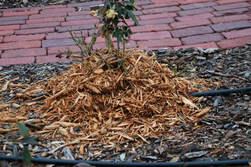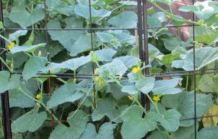Mounding is normally finished by Thanksgiving. After the ground has frozen, add a 4-inch mulch of straw, leaves or hay for further protection. More soil may be spread on top of the mulch to keep it in place. Do not add the mulch before the ground freezes or mice may invade and feed on the roses over the winter. The purpose of these coverings is not only to moderate the cold, but also to prevent warm days during the winter or early spring from stimulating growth that is tender to returning cold weather. Excessively tall canes should be pruned to a height of 36 inches and tied together to prevent them from being whipped by strong winter winds. Wind can damage the crown of the plant or loosen the surrounding soil.
Next spring, remove coverings before new growth starts. If soil was used for mounding, remove from the area so that the level of soil stays constant from year to year. Wait until after the ground thaws, or the tops may begin growing before the roots can provide water. (Ward Upham)
Winterizing Roses
Though most shrub roses are hardy in Kansas, other types of roses can be more tender. For example, the hybrid teas have certain species in their ancestry that originated in the warm climate of southern China. These roses need protection to reliably survive Kansas winters. Mound soil or compost about 8 to 10 inches high around each plant. If using soil, bring it in from another part of the garden. Do not pull it from between plants because this can damage the rose roots or make them more susceptible to cold.
Contents from K-State Horticulture Program.





